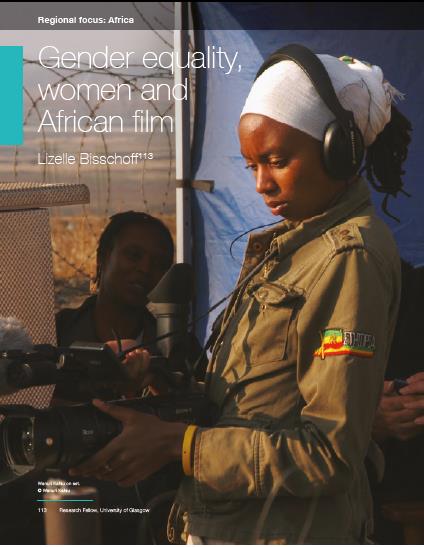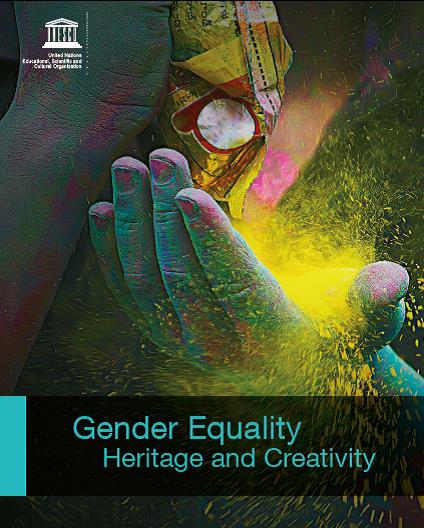Gender Equality: Heritage and Creativity
Published20 Nov 2014

Em que medida as mulheres estão representadas como criadoras, no cinema africano? Que temas tratam? O que caracteriza a presença das mulheres? Que barreiras enfrentam? Perguntas feitas por Lizelle Bisschoff no texto "Gender Equality, Women and African Film", incluído no documento da Unesco dedicado às questões de género e igualdade, em termos culturais.
Female African filmmakers, like female directors all over the world, are hugely underrepresented in comparison to their male counterparts. Statistics show that women make up less than 10 per cent of film directors and less
than 15 per cent of screenwriters internationally (Dovey, 2012). This also means that female directors are much
less visible than male directors in the fi lm industry, and the small handful of award-winning or internationally –
renowned female fi lmmakers are regarded as an unusual oddity. Despite the underrepresentation of women in the African film industries, film in Africa has huge potential to enable consciousness-raising, storytelling and creative expression, perhaps even more so than other creative industries due to the prevailing economic, social and political barriers to literacy in many African countries, especially for young girls. The social and political currents
in contemporary African societies involve new levels of critical awareness. Film, when used as a tool in this
process of awareness-raising, becomes a terrain in which conventional and stereotypical representations are
challenged.

O texto citado integra o relatório Gender Equality: Heritage and Creativity que dá conta, pela primeira vez, do estado da igualdade de género, em relação a acesso, participação e contribuição para a cultura, um dos focos desta instituição. Baseia-se em documentos da ONU e em resoluções da Assembeia Geral, incluindo o Plano de Acção para as Políticas Culturais do Desenvolvimento da Conferência de Estocolmo de 1998, o relatório da Unesco sobre Diversidade Criativa de 1995, inquéritos enviados aos estados-membros bem como estudos de caso em vários países do mundo.
A UNESCO Global Priority, gender equality refers to the roles and responsibilities of men and women, along with gender dynamics, created and embedded in families, societies and cultures. UNESCO’s approach to promoting gender equality is based on a commitment to cultural rights and cultural diversity, underpinned by the international human rights framework. From this angle, cultural diversity and human rights must be seen to be mutually beneficial, with gender equality as a precondition for genuinely people-centred development. This was the argument that I brought to the 2014 Commission on the Status of Women, where I joined other UN leaders in highlighting the need to tackle all forms of discrimination against women and girls, including through discriminatory laws, social norms, practices and stereotypes. In all development efforts, we must ensure that culture is never invoked to justify the infringement on, or limitation of, human rights.
Do prefácio, por Irina Bokova, Directora-Geral da Unesco
Culture is in constant motion and is always linked to power relations. Cultural rights must be understood as also relating to who in the community holds the power to define its collective identity. Belonging does not confer equality within the community, and there can be multiple views within a community as to the elements that constitute the essentials of one’s culture. It is imperative to ensure that all voices within a community, representing the interests, desires and perspectives of diverse groups,
are heard without discrimination.Discourses that essentialize cultures, presenting cultures as monolithic, static and ahistorical, must be vigorously contested to ensure these no longer form the basis for challenging the universal legitimacy and applicability of human rights norms. Under international human rights law, no one may invoke cultural diversity to infringe upon or limit human rights. International human rights norms clearly state that restrictions on the cultural rights of women, which ultimately amount to restrictions on the principles of non-discrimination and equality, must not be imposed to preserve cultural diversity. In addition, the cohesion of a specific cultural community – be it transnational, national or sub-national –should not be achieved to the detriment of one group within the community, such as women.
Farida Shaheed, relatora especial na área dos direitos culturais, nomeada pelo Conselho de Direitos Humanos das Nações Unidas e activista dos direitos das mulheres
O relatório completo disponível em Gender Equality: Heritage and Creativity
